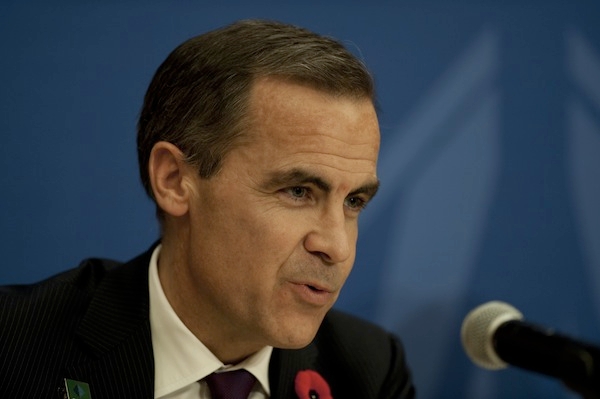Hiring Mark Carney may just be George Osborne’s best move since becoming Chancellor. Britain badly needed a break from the failed economic consensus which still hangs around the Bank of England like a bad smell. In August, The Spectator implored the Chancellor to mount a global search. When Carney ruled himself out, I gave up hope and resigned myself to Paul Tucker, who would be likely to keep Britain on its current Faustian monetary path paved with freshly-minted banknotes.
Instead, Osborne has succeeded in hiring one of the best-qualified of all the Queen’s 137 million subjects — from a country that knows a thing or two about economic crises and how to handle them. Carney is not an academic like Sir Mervyn; he spent 13 years at Goldman Sachs and knows the banks and their tricks. He is anti-bailout and commands sufficient international respect to be made chairman of the G20’s Financial Stability Board.
Carney hails from a land of (comparative) fiscal sanity. The crash was global but there were no bust banks in Canada. Its troubles stand no comparison to those of the United States – and the secret was better regulation and a stronger commitment to sound money. There was no purblind regulation, no central bankers looking amazed at what the merchant bankers had been getting up to right under their noses.
Carney said recently that ‘The crisis has shaken the foundations of monetary economics, making this a great time to be an academic but a more challenging one to be a practitioner.’ You would not hear Sir Mervyn making the same statement. Nor would you hear him acknowledge the Austrian school of economics and its criticism that:
‘inflation targeting can actively feed the creation of financial vulnerabilities, especially in the presence of positive supply shocks. For example, in an environment of increased potential growth resulting from higher productivity, inflation-targeting central banks may be compelled to respond to the consequent “good” deflation by lowering interest rates. From the Austrian perspective, this misguided response stokes excess money and credit creation, resulting in an intertemporal misallocation of capital and the accumulation of imbalances over time. These imbalances eventually implode.’
When Carney said this, he made clear he does not regard himself as an Austrian.But in recognising such concerns – and admitting that inflation targeting is up for debate – he goes much further than his predecessor.
Carney knows Britain well enough. He was educated in Oxford and worked in Goldman Sachs from London for a while. His wife, a Brit, took Canadian passport. He’ll now take a British one. He’ll leave his job running Canada’s central bank in June – about a year early – and start in Threadneedle St in July.
It will, needless to say, be the first time a foreign national has run the Bank of England. But when you saw ex-civil servants like Gus O’Donnell throwing their hat in the ring, you knew we needed global help. In August, The Spectator’s leader had this to say:-
‘When the BBC was looking for a new director-general, it spent £150,000 on international headhunters only to promote an internal candidate. The search for a new Governor is vastly more important, given the outsourcing by the Treasury of so much British economic policymaking. George Osborne should scour the globe, and double the salary if need be. He badly needs help, and the right Bank of England governor could provide it. To find the right man or woman will perhaps be the single most important act of his chancellorship.’
Osborne gets a lot of stick from Coffee House. But this is a coup: he has poached a serving central bank governor and found a badly-needed new boom. I gather that the interview and appointment was done on the QT in London the weekend before last. Secrecy was vital; no serving head of a central bank could afford to apply for another job and then be rejected in public. Not that there was any risk of rejection: I understand that Carney was always Osborne’s no1.
So let’s wish the incoming Governor luck. He’ll certainly need it.
Here’s Osborne explaining it all to Robert Peston:-
http://audioboo.fm/boos/1080523-osborne-on-carney-peston-interview-26-11-12
UPDATE: Ladbrokes has given Carney a very British welcome with the following odds:
- Carney will authorise a larger volume of QE than Mervyn King* 8/1
- Interest rates will rise above 2.5pc in Carney’s first year 4/1
- UK base rate to rise above 7.5pc in Carney’s first year 25/1
And if the last one seems remote, remember Carney was 12/1 to win the job this morning. The unexpected seems to be happening rather a lot in economics.







Comments